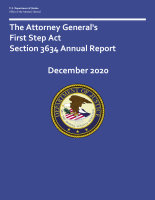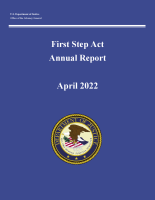Attorney General
Gun Wars and Community Terrorization: Investigating Longitudinal Gang Violence in New Jersey from a Networked Perspective
The Attorney General's First Step Act Section 3634 Annual Report December 2020
First Step Act Annual Report (April 2022)
Tailoring to a Mandate: The Development and Validation of the Prisoner Assessment Tool Targeting Estimated Risk and Needs (PATTERN)
Laboratory Information Management System Implementation
Booker and Beyond Analyzing Sentencing Reform and Exploring New Research Directions
This webinar features a discussion of previously published research on the U.S. Supreme Court’s 2005 Booker decision - which effectively transformed the United States Sentencing Guidelines from a mandatory, to an advisory, system. The presentation will address selected research findings from the last 15 years. Individual participants will briefly review their previous research findings with particular attention paid to the analytic methods used.
See the YouTube Terms of Service and Google Privacy Policy
Desistance From Crime: Implications for Research, Policy, and Practice
Most scholars would agree that desistance from crime – the process of ceasing engagement in criminal activities – is normative. However, there is variability in the literature regarding the definition and measurement of desistance, the signals of desistance, the age at which desistance begins, and the underlying mechanisms that lead to desistance. Even with considerable advances in the theoretical understanding of desistance from crime, there remain critical gaps between research and the application of that research to practice.
See the YouTube Terms of Service and Google Privacy Policy
NIJ Multisite Impact and Cost-Efficiency Evaluation of Veterans Treatment Courts, Fiscal Year 2022
Deadline Notice
The deadline for the funding opportunity discussed in this video has passed.
See the YouTube Terms of Service and Google Privacy Policy
Domestic Violence and Mass Shootings: A Review of Current Academic Literature
Strengthening data-driven pretrial release in New Jersey
Longevity of American Terrorists: Factors Affecting Sustainability
2020 Review and Revalidation of the First Step Act Risk Assessment Tool
Review and Revalidation of the First Step Act Risk Assessment Tool
Impact of DNA Evidence In Addressing Human Rights Issues in the Philippines and Other Uses of DNA Worldwide, presented by Dr. Corazon DeUngria and Chris Asplen
ALASKA'S BAN ON PLEA BARGAINING
Proceedings of the Harvard Law School Conference on International Cooperation in Criminal Matters
Prosecuting Complex Drug Cases: The Challenge for Local Prosecutors
Protecting Against Stress and Trauma - NIJ Research for the Real World Seminar
At this Research for the Real World seminar, NIJ brought together law enforcement practitioners and leading researchers in the field of stress to discuss the current research evidence and practical benefits of targeted stress-management interventions and how they can promote officer mental wellness.
See the YouTube Terms of Service and Google Privacy Policy
NIJ LEADS Program Increases Research Capabilities of Law Enforcement Officers
This video, produced for IACPTV, provides an overview of the NIJ Law Enforcement Advancing Data and Science (LEADS) program. NIJ LEADS Scholars from Dayton and Newark police departments provide an overview of the LEADS program as they describe their projects and experiences working in the program.
Hear from LEADS scholars Major Wendy Stiver, Dayton Police Department, and Captain Ivonne Roman, Newark Police Department.
See the YouTube Terms of Service and Google Privacy Policy
Notes From the Field: Addressing Mental Health Is an Important Factor in Improving School Safety
Protecting Against Stress & Trauma: Research Lessons for Law Enforcement– Defining the Problem
See the YouTube Terms of Service and Google Privacy Policy
White Collar Crime
The subprime mortgage industry collapse has led to a record number of foreclosures. In this environment, the interest mortgage fraud has risen, along with questions of how fraud contributed to the crisis. Henry Pontell and Sally Simpson discuss what they have learned about investigating and prosecuting white-collar criminals, the role of corporate ethics in America, and what policymakers and lawyers can learn from evidence of fraud.
See the YouTube Terms of Service and Google Privacy Policy
Wrongful Convictions: The Latest Scientific Research & Implications for Law Enforcement
What does science tell us about case factors that can lead to a wrongful conviction? Dr. Jon Gould of American University will discuss the findings of the first large-scale empirical study that has identified ten statistically significant factors that distinguish a wrongful conviction from a "near miss." (A "near miss" is a case in which an innocent defendant was acquitted or had charges dismissed before trial). Following Dr. Gould's presentation, Mr. John R.
See the YouTube Terms of Service and Google Privacy Policy





